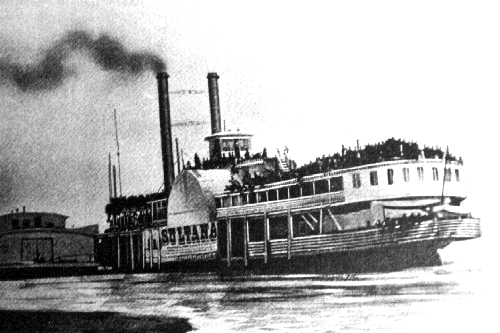

The most awful boiler explosion known to history was undoubtedly the one which destroyed the Mississipi river steamboat Sultana, in 1865, the number of persons killed in that one accident being no less that 1,238.
The Sultana and the Luminary left New Orleans together, on April 21, 1865, and raced up the river for Vicksburg, where many Union soldiers, just released from southern prisons, were awaiting transportation to the north, The Luminary reached Vicksburg first, but she did not get the contract to carry the soldiers, and she shortly proceeded northward on her trip.
About ten hours before reaching Vicksburg,, a leak developed along a joint at the front end of one of the Sultana's boilers, forcing her to lay over at that place, 33 hours for repairs, The repairing was done, apparently, by a competent boiler maker, and it consisted in putting on a "soft patch," of quarter-inch iron plate.
Previous to the arrival of the Sultana, the Henry Ames had carried 1,300 of the soldiers north, and the Olive Branch had taken 700 more. It was at first reported that no men would be sent by the Sultana, as the rolls had been made out for only 700 of those that remained. Before the Sultana was reported to depart, however, it was decided to send all of the remaining men by her, counting and checking them as they went aboard, and preparing the rolls afterwards. She therefore took on 1,866 soldiers, included 33 paroled officers; and she carried, also, 70 cabin passengers, and a crew of 85.
No inspection was made of the boat at the time, to determine her carrying capacity or condition. The cooking facilities were grossly inadequate, and the men, who did not even have room to lie down, felt that they were treated with unnecessary harshness, in being thus crowded together in great discomfort, when at least two other northward-bound boats had been at the landing during the day, and one very good one (the Pauline Carroll) was actually lying alongside at the time of embarkation.
Proceeding up the river the Sultana passed Helena, Ark., on April 26, at 10 o'clock a.m. It was there that the photograph was taken from which the accompanying engraving was prepared, and for which we are indebted to Mr. Paris C. Brown of Cincinnati, Ohio. At about 3 o'clock a.m. on April 27, 1865, and only seventeen hours after this photograph was taken, the repaired boiler exploded with tremendous violence, a few miles above Memphis, Tenn. Many persons were killed outright, and many more were thrown into the river and drowned; and the wrecked vessel took fire, and was entirely destroyed. Of the soldiers, 1,101 (including 19 officer) were killed, and the passengers and crew 137 were killed; the total number of lives lost being 1,238, as we have already stated.
So far as we are aware, the cause of the explosion was never definitely ascertained. The boiler was a return tubular, -- a type which had not been previously tried in the river service. We are told that the shell was 48 inches in diameter and 0.354 inch thick. A new iron shell of this character, with a double-riveted joint having an efficiency of 70 per cent., could carry a pressure of about 90 lbs., with a factor of safety of five. It is likely that the actual pressure carried was 150 lbs. or even more; but in justice to the officers of the Sultana it should be remembered that is was customary, at that time, to operate the boilers on river steamboats under a factor of safety which would not now meet with the approval of any engineer.
We do not know whether the initial line of rupture in the boiler ran through the original sheet, or through the patch, which was only 0.25 in. thick; nor do we know the diameter or pitch of the rivets in the shell, nor of the bolts that were used in putting on the patch. It is quite possible that a knowledge of the points would shed light upon the cause of the explosion.
The boilers of the Sultana had been examined by a government inspector, at St. Louis, about a fortnight before the explosion, and were then pronounced to be safe and in good condition. The chief engineer, and the second engineer (who was fatally scalded), testified that the boilers were carefully watched after the repairs at Vicksburg, that they contained plenty of water at all times, and that they were apparently all right, up to the very moment of the explosion.
The Sultana was undeniably overloaded, and many ugly charges and counter charges of bribery were current among the Union officers who had to do with the transportation of the soldiers, in view of the fact that there were other serviceable boats at hand, anxious to get a share of the business.
[There was a well-known river steamer bearing the name Sultana, plying upon the Mississippi river some years prior to the Civil war; but the vessel to which this article relates was built either at Cincinnati, Ohio, or at Wheeling, W. Va., in 1862-3, being completed, if we are correctly informed, in January, 1863]